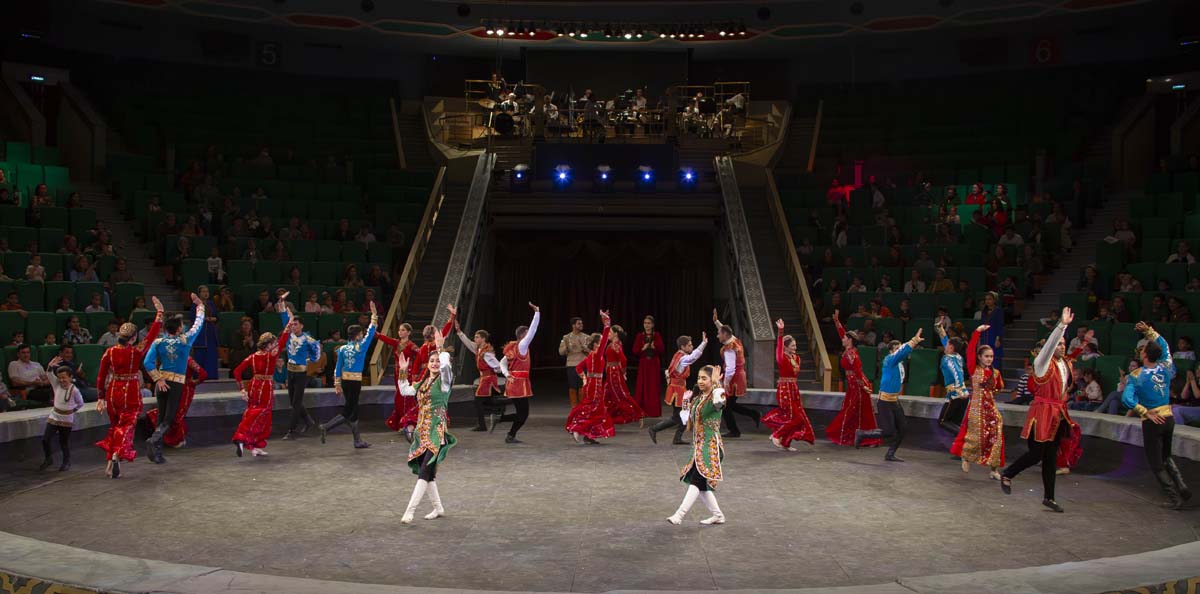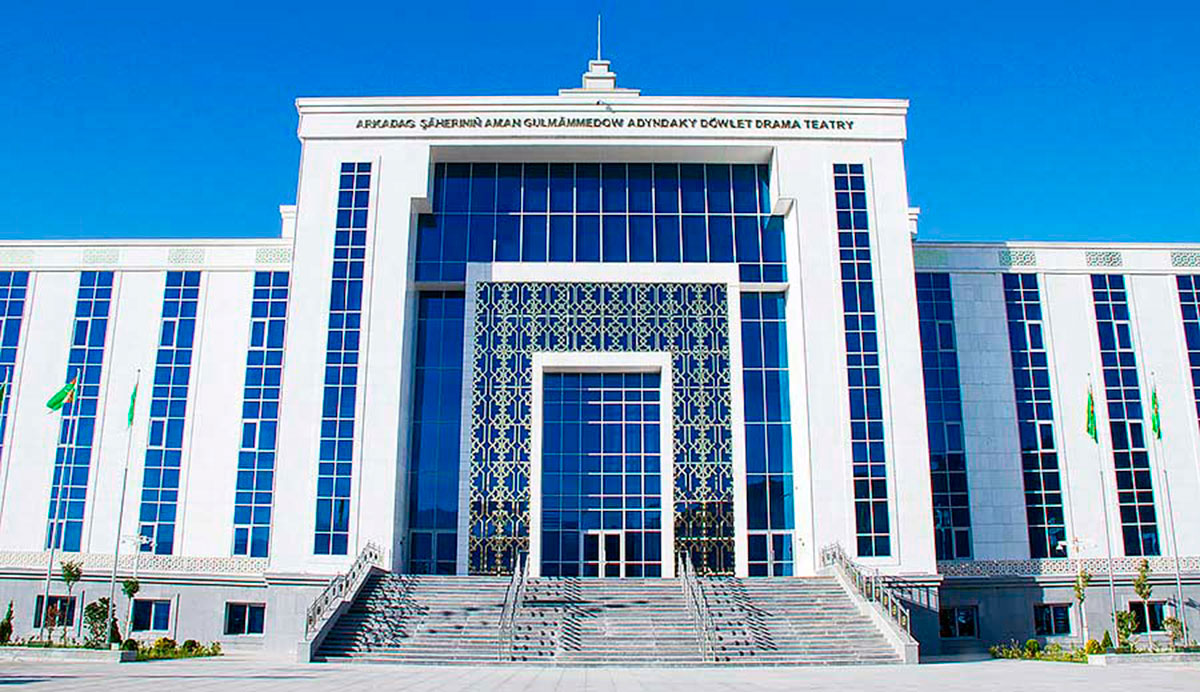She was the first Turkmen woman film director. They say that you can find everything on the Internet. There are only a few lines about Yazgul Shamuradova though.
However, it is good to know that articles on famous film director Mark Donskoy provide more information about her: “The first Turkmen woman director, who directed Turkmen-dubbed versions of films. Among them are ‘Chapaev’, ‘Lenin in 1918’, ‘Clouds Over Borsk’, ‘October Days’, ‘There Is Such a Lad’, ‘Virgin Soil Upturned’, ‘They Were Known Only By Their Faces’ and ‘Walking the Streets of Moscow’. She was an assistant director on the set of Donskoy’s ‘How the Steel Was Tempered’ (1942)”.
Sadly, it is little known about Yazgul Shamuradova today. And it took much effort to find a photograph of the woman director. It was truly miraculous to find out that film critic, Honored Cultural Worker of Turkmenistan Gapbar Ballyevich Khummedov had a photo of Yazgul.
Giving their daughter (born in January) the name “Yazgul” (translates as ‘a spring flower’ from Turkmen), her parents, who were ordinary rural workers, could not have imagined that it would determine her destiny. Like first spring flowers turning towards the sun, the girl with a creative mind always strove to learn something new.
Difficult circumstances forced Yazgul’s parents, who lived in the village of Yalkym, Bayramali district, to send their then six-year-old daughter to an orphanage. Back then, the girl’s unquenchable thirst for knowledge set her apart from her peers. She always asked her teachers questions trying to get to the heart of the matter.
Motivated by her insatiable desire of knowledge, Yazgul went to teachers’ training college in the town of Charjou at the age of 14. After finishing it, she began to work as a copy editor for the newspaper ‘Lenin Yoly’ (‘The Way of Lenin’). Her new job offered her the chance to communicate with people and explore new dimensions.
Later, when she married and moved to Ashgabat, Yazgul worked for the republic-wide youth newspaper ‘Yash Kommunist’ (‘The Young Communist’) as the head of a women’s department.
Driven by her desire for creative expression, new experiences and knowledge, Yazgul moved forward. After gaining considerable work experience as a journalist and an editor, she stepped into the enchanting world of cinema to which she devoted forty years of her life, working as the film director at the Turkmenfilm Studio.
It was at the Studio that Yazgul Shamuradova found her true calling in life. In the late 1930s sound films began to dominate creating a need for making soundtracks for films in Turkmen.
Yazgul was amply repaid for her hard work, talent and desire for novelty. She was fortunate to have been one of the pioneers in the Turkmen film industry. And when she embarked on her film directing career, the first national films just started to come out: ‘Seven Hearts’ directed by Nikolay Tikhonov, ‘Umbar’ by Alexander Mayakovsky, and ‘Dursun’ by Evgeny Ivanov-Barkov.
At the same time, there was a need for Turkmen-dubbed versions of foreign-language and Soviet films. Yazgul Shamuradova was the ideal choice for this. This shaped her decades-spanning career.
Together with a group of translators Yazgul immersed herself into the entirely new world of dubbing. Initially, the process was not always smooth and there were imperfections. Working on newsreels and documentaries was particularly difficult: in those years any error could be fatal.
When it comes to challenges of dubbing, only professionals know and understand them well. The process of dubbing starts with the literal translation of the original speech, then the translated text is adjusted to match the original in length. Then, auditions are held for dubbing actors, followed by the recording process. And only after that sound technicians create and record sound effects and background noises. The work is reminiscent of that of a conductor. To initiate, streamline and control the complex process is what the dubbing director does.
Over time, Turkmen film directors relied only on Yazgul Shamuradova to record audio and music tracks for their movies.
Yazgul had a talent for selecting the right type among local actors to voice and perfectly fit the role in a foreign-language film. To this end, she regularly attended performances at local theaters. Yazgul was able to recognize the voices of many Turkmen actors with her eyes closed. Film audiences could hardly imagine what a great deal of effort had been put in the dubbing work to offer them an enjoyable experience of watching a foreign movie.
It was even more challenging for voice actors. They came to the Studio after their evening performances and at times had to work into the early hours.
In the late 1930s Yazgul collaborated with Alty Karliev, Bazar Amanov, Aman Kulmamedov, Sona Muradova, Nurbibi Kutlyeva, Tachbibi Gafurova, Nurjemal Soyunova, Ata Durdyev, Oguljeren Ishankulieva, Elizaveta Karaeva, Akja Jumadurdyeva, Myrat Berdyev, Enejan Orazmuradova, among others, for her dubbing projects. Each of them is a big-name star today. But back then, they were greatly honored to be invited by true professional Yazgul Shamuradova, whom they respected much.
Not only was Yazgul one of the first dubbing directors, she was also the first Turkmen woman film director. To succeed in filmmaking, it was necessary to acquire special expertise in directing and acting. Young Yazgul was one of the trailblazers in these demanding areas.
- Mark Donskoy was a powerful formative influence on Yazgul and left an indelible stamp on her directing career, Gapbar Khummedov told. The renowned director filmed ‘How the Steel Was Tempered’ and ‘The Rainbow’ during wartime at the Turkmenfilm Studio in Ashgabat. And Yazgul Shamuradova assisted Mark Donskoy in the production of the former.
Working with the great film director was invaluable practical experience for Shamuradova. She made dubbed versions of more than forty famous films.
Her selfless work and talent were highly praised by the government and her fellow workers. She was a member of the Union of Cinematographers and was given the title of Honored Art Worker of Turkmenistan. Yazgul was awarded the Distinguished Labor Medal and the Certificates of Honor of the TSSR Supreme Soviet.
Later in her career, Yazgul Shamuradova began working on a film entitled ‘It Is Called Life Itself’, but her severe and chronic disease did not let her complete the film.
Yazgul Shamuradova, who was one of the pioneers in Turkmen filmmaking and film dubbing, nurtured many talented students. Even today, her legacy helps young specialists, who are just starting out on their behind-the-scenes, but uniquely important careers in film production.
Golden Age correspondent






